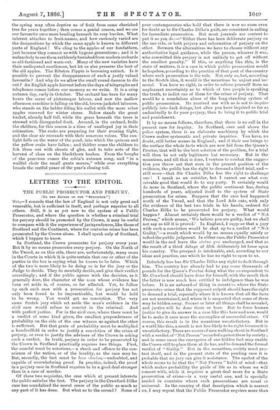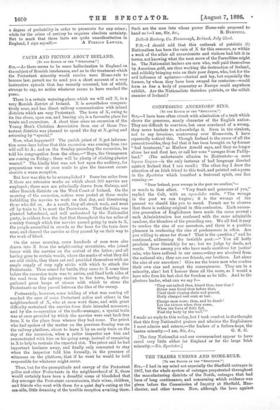LETTERS TO THE EDITOR.
THE PUBLIC PROSECUTOR AND PERJURY. [To THE EDITOR OF TILE "SPECTATOR."]
concede that the law of England is not only great and venerable, but is sufficient in itself, and perhaps superior to all others. Still, it is as yet new to the system of a Public Prosecutor, and where the question is whether a criminal trial for perjury should be promoted by the Crown, it may be useful to compare with it the experience of jurisprudences, like those of Scotland and the Continent, where for centuries crime has been prosecuted by the Crown alone. I shall speak only of Scotland, which I happen to know.
In Scotland, the Crown prosecutes for perjury every year. But it by no means prosecutes every perjury. On the North of the Tweed, as on this side, there are, unfortunately, many cases in the Courts in which it is quite certain that one or other of the parties in the box is saying what he knows to be false. Which of the two is more likely to be doing so is for the jury or the Judge to decide. They do mentally decide, and give their verdict accordingly ; and if the public agrees with the decision, as it generally does, the character of the man whose evidence has been set aside is, of course, so far affected. Yet, to follow up each such case with a prosecution for perjury has not only been found to be impracticable, but would be held to be wrong. You would get no conviction. The very same Scotch jury which set aside the man's evidence in the civil case would refuse to convict in the criminal. And with perfect justice. For in the civil case, where there must be a verdict of some kind given, the smallest preponderance of probability on the side of the one witness as against the other is sufficient. But that grain of probability must be multiplied a hundredfold in order to justify a conviction of the crime of perjury, or even to justify the advisers of the Crown in asking such a verdict. In truth, perjury in order to be prosecuted by the Crown in Scotland practically requires two things. First, the scandal must be notorious,— a shock and offence to the con- science of the nation, or of the locality, as the case may be. But, secondly, the fact must be luce clarius,—undoubted, and capable of overwhelming proof. In practice, indeed, the proof in a perjury case in Scotland requires to be a good deal stronger than in a case of murder.
Of these two requisites, the case which at present interests the public satisfies the first. The perjury in the Crawford-Dilke ease has scandalised the moral sense of the public as much as ally part of it has done. But what as to the second ? Some of your contemporaries who hold that there is now no room even for doubt as to Sir Charles Dilke's guilt, are consistent in calling for immediate prosecution. But most journals are content to put it as you do :—" Either there has been deliberate perjury on the one side, or both perjury and subornation of perjury on the other. Between the alternatives we have to choose without any authoritative legal guidance, while the person, whoever it was, who committed this perjury is not unlikely to get off without the smallest penalty." If this, or anything like this, is the state of matters, it is a case in which public prosecution would be hopeless, according to the practice of that part of the country where such prosecution is the rule. Not only so, but, according to the Scotch idea, it would in the meantime be unjust and im- moral. You have no right, in order to relieve yourself from an unpleasant uncertainty as to which of two people is speaking the truth, to indict one of them for the crime of perjury. That would be a scandalous abuse of the long-standing system of public prosecution. Its received use with us is not to inquire publicly into dark doings, but after you have inquired so far as undoubtedly to fix your perjury, then to bring it to public trial and punishment.
It by no means follows, therefore, that there is no call in the present case for inquiry. In Scotland, over and above the police system, there is an elaborate machinery by which the Crown makes systematic and private inquiries. You have, no doubt, still better means in England ; and if their use brings to the surface the whole facts which are now hid from the Queen's Proctor, that will be the best solution of the problem, for a trial will then be not only legitimate but necessary. But in the meantime, and till that is done, I venture to combat the sugges- tion you throw out that even in the present position of the evidence, the public has the right to demand a third trial, and— still more—that Sir Charles Dilke has the right to challenge one ! I speak as an outsider, but I cannot see what con- ceivable good that would do to any party. It certainly would do none in Scotland, where the public sentiment has, during hundreds of years, adjusted itself to the system of State prosecution for crime. Suppose that the case had happened north of the Tweed, and that the Lord Advcate, with only the evidence of the last two trials in his hands, ordered Sir Charles Dilke to be prosecuted for perjury. What would happen ? Almost certainly there would be a verdict of "Not Proven," which means, We believe you are guilty, but we shall not say so till it is proved.' In England, I suppose that a jury with such a conviction would be shut up to a verdict of "Not Guilty,"—a result which would by no means equally satisfy or reflect the public judgment. In either case, the Public Prosecutor would in the end leave the status quo unchanged, and that as the result of a third deluge of filth deliberately let loose upon his country. The prospect is intolerable, and, according to our ideas and practice, one which he has no right to open to us.
Infinitely less has Sir Charles Date any right to do it through him. The country has already had to pay some thousands of pounds for the Queen's Proctor doing what the co-respondent to Mr. Crawford should have done for himself, with the result that the latter is now much less entitled to indulgence than he was before. It is an unheard-of thing in countr;es where the State prosecutes crime that the supposed culprit should have the right to demand a trial, especially where it is known that all the facts are not ascertained, and where it is suspected that some of them may be hidden away. Sooner or later all things shall be revealed, and justice will be done there or here. But to force human justice to give its answer in a case like this here and now, would be to make it once more the accomplice of successful crime. Of course, this result is in the meantime unsatisfactory. But in a world like this, a result is not less likely to be right because it is unsatisfactory. There are scores of men walking about in Scotland with a verdict of "Not Proven" recorded against them by society ; and in some cases the emergence of one hidden fact may enable the Crown still to place them at its bar, and to demand the formal verdict of " Guilty." But in the meantime, society must pro- tect itself, and in the present state of the pending case it is probable that no jury can give it assistance. The upshot of the whole seems to be that the "Not Proven" habit of mind—that which makes probability the guide of life as to whom we will consort with, while it requires a great deal more for a State prosecution of crime—is a very useful one, and is specially needed in countries where such prosecutions are usual or universal. In the country of that description which is nearest us, I may repeat that the Public Prosecutor requires more than a degree of probability in order to prosecute for any crime ; while for the crime of perjury he requires absolute certainty. But to mark that these facts are quite unauthoritative in



































 Previous page
Previous page